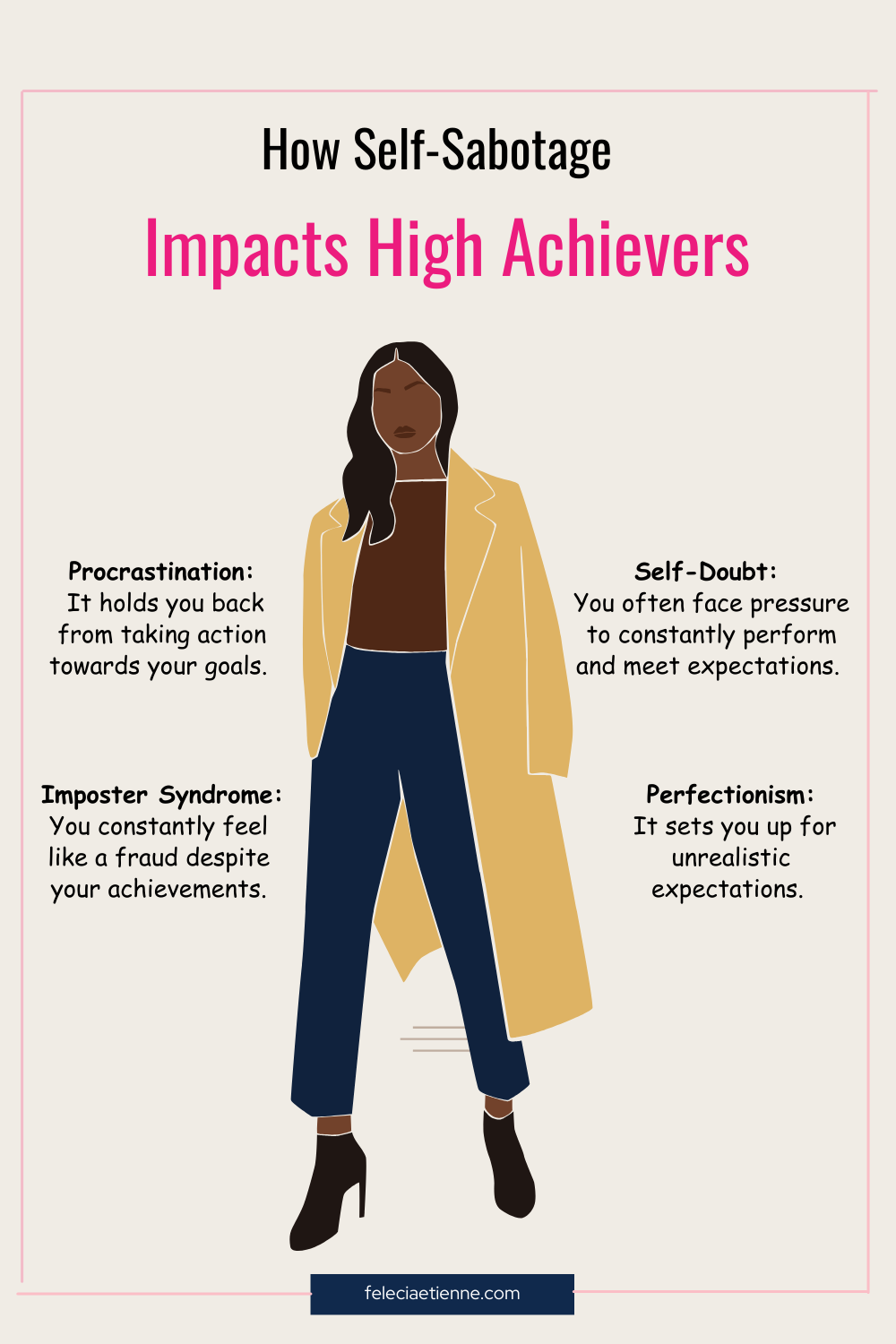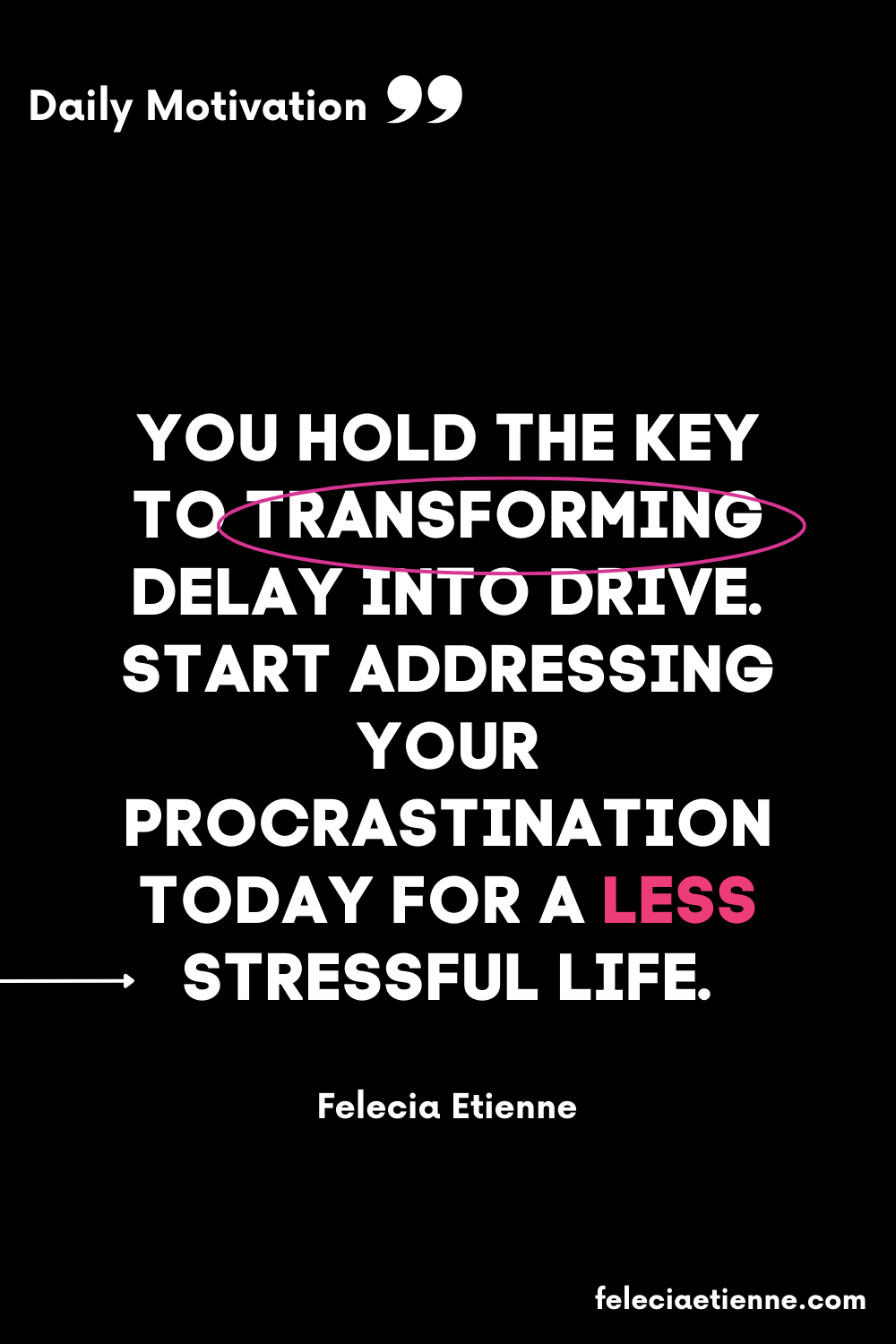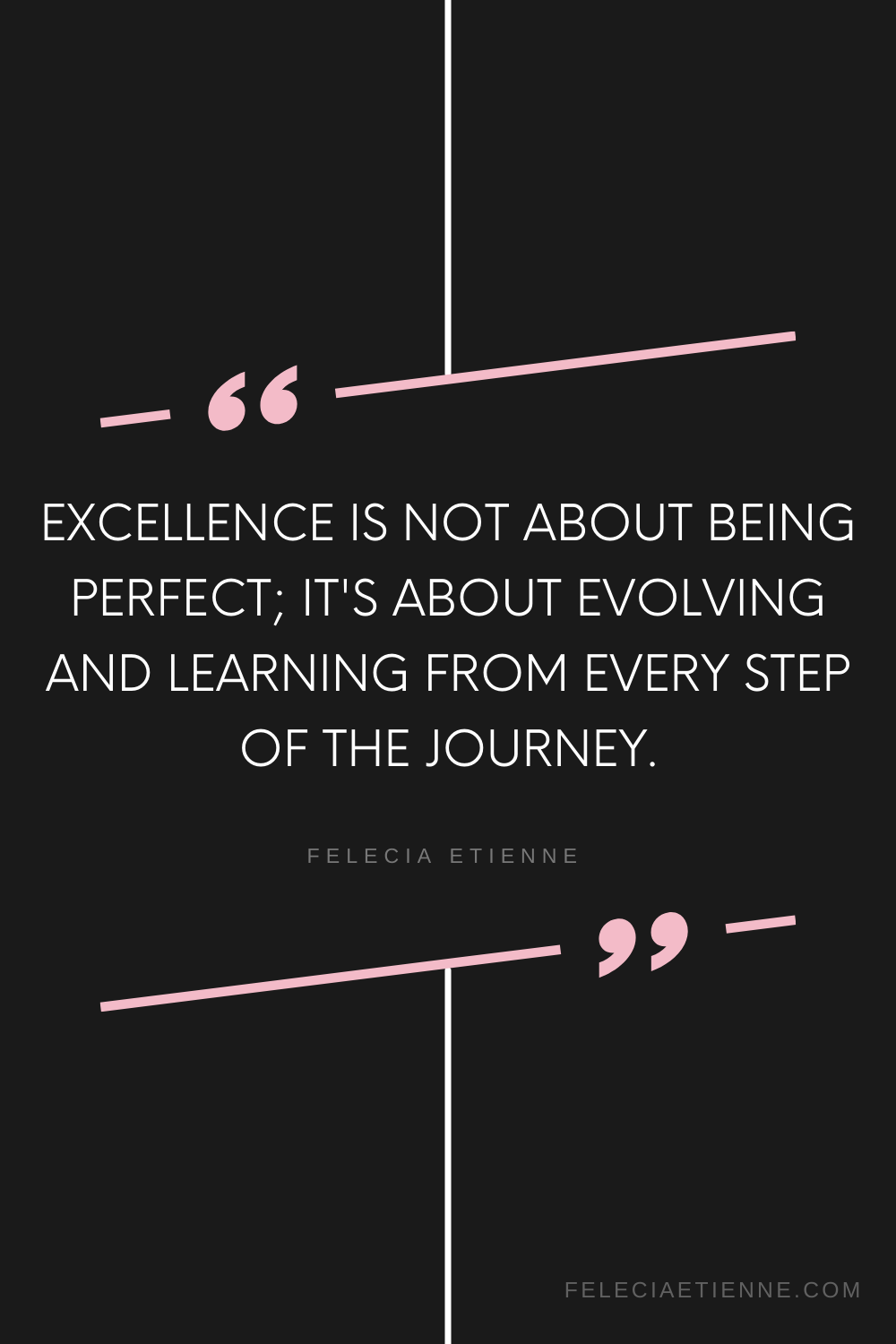The Impact of Self-Sabotage on High Performers: Strategies for Success
Ever felt like you're about to break through, but something invisible yanks you back? You're in good company. Picture this: you're nailing your goals, climbing up the success ladder, and then—wham—everything just stops moving. Annoying, isn't it? That sneaky enemy, self-sabotage, might be the culprit stopping you from reaching your full potential. It's a pretty common battle, but don't sweat it. We've got your back, ready to help you tackle it just like we've done for loads of others.
"Self-sabotage is our own doing, a way we subconsciously hinder our progress," says Dr. Ellen Hendriksen. It's that stealthy thief of performance, lurking in the shadows of your achievements. But here's the good news: breaking free from the chains of self-sabotage is not just a distant dream, it's a tangible reality within your reach. With the right strategies and mindset, you can conquer it and unleash your full potential, paving the way for your future success.
Ready to dive deep into self-sabotage, how it sneakily messes with your efforts, and, most importantly, how to beat it? This blog is more than just a resource; it's your trusted guide on the journey to turning those invisible barriers into launchpads for success. Let's start on this adventure together, turning your setbacks into stepping stones for your success story.
Understanding Your Self-Sabotage
“Turn self-doubt into self-belief. Your journey to greatness starts with recognizing your worth.”
RELATED ARTICLE: Overcoming Self-Sabotage: Recognizing and Defeating Your Inner Saboteur
What is Self-Sabotage?
Have you ever felt like you're the biggest roadblock in your path to success and personal growth? That's self-sabotage. These harmful behaviors or thoughts, usually hidden in our subconscious, stem from deep-seated fears and anxieties. Yet, the power to change is in your hands. Identifying these self-destructive actions is crucial in overcoming them and unleashing your true potential.
Common Self-Sabotaging Behaviors
You might find yourself procrastinating, chasing perfection to the point of paralysis, engaging in negative self-talk that undermines your confidence, or dodging challenges that could lead to growth. These habits create roadblocks and keep you from reaching your full potential.
The High Stakes for High Achievers
For high achievers like you, the stakes couldn't be higher. Think about how these destructive patterns might be affecting your performance and career. Did you know about 70% of people experience impostor syndrome at some point in their lives (source: APA)? Impostor syndrome is when you can't shake the feeling that you're a 'fraud,' no matter how much you've achieved. You're always waiting for someone to figure out you don't belong. This form of self-sabotage can seriously derail your progress and satisfaction.
Why Self-Sabotage Matters to You
“The only thing standing between you and your greatness is your inner critic. Silence it and unleash your true potential.”
Understanding why self-sabotage matters is crucial for high achievers like you, who face enormous pressure to always perform at their best. This pressure can lead to a relentless cycle of anxiety, decreased productivity, and a dip in self-esteem, directly impacting your inner peace and your connections with the world around you. Each time you undermine your own efforts, you chip away at your self-confidence, creating a cycle where failure seems inevitable. This not only affects how you view yourself but also how you interact and relate to others, casting a shadow of doubt over your capabilities and worthiness.
The Impact of Self-Doubt
“Don’t let self-doubt dim your light. Shine brightly and let your success speak volumes.”
Self-Doubt: The Voice That Holds You Back
Let me share a story that might sound all too familiar. Imagine you're on the verge of chasing your dreams, but a tiny voice whispers, "You're not good enough." Surprisingly, research shows that 75% of us wrestle with self-doubt at some point. If you're always striving for excellence, you're probably well acquainted with this inner conflict. The push to excel and exceed expectations ironically fuels a relentless inner critic. It's a strange paradox: our ambition, while driving our success, simultaneously sows seeds of doubt, turning potential victories into moments of hesitation.
Consider the times you've prepared for something significant, like a crucial presentation, only to have your confidence shaken by uncertainty. Research highlights a harsh reality: self-doubt doesn't just hold us back; it actively undermines our performance, increases stress, and diminishes our joy.
But here's the turning point: acknowledging this hidden adversary is our first step towards empowerment. Realizing that self-doubt accompanies the journey of high achievers enables us to face it, question its validity, and break through the barriers we've imposed on ourselves. When you hear that internal critic, remember: you've identified the obstacle. This is your chance to neutralize it.
From my experience, I've learned that feeling self-doubt is a part of being human. It doesn't need to control our actions. Together, we can move from doubt to determination, transforming our inner dialogue from a critic to a coach.
RELATED ARTICLE: 13 ways to overcome Self-Doubt and Thrive
The Impact of Self-Sabotage on High Achievers
“Every high achiever battles procrastination. The difference? They face it head-on and turn it into productivity.”
Procrastination: The Thief of Time and Potential
“Procrastination steals your time and potential. Conquer it, and watch your dreams become reality.”
Even as a high achiever, you might find yourself battling procrastination. Take Bill Gates, for instance. He used to delay everything until the last minute. But as his business grew, he realized he had to break this bad habit to keep up with his peers. You might be in a similar situation—waiting until the last minute, feeling the stress pile up. Let's face it; procrastination can be a silent saboteur.
The Impact of Procrastination
Did you know that procrastination is linked to higher stress levels and decreased well-being? Research from the American Psychological Association reveals that 20% of adults are chronic procrastinators. This means that they consistently avoid tasks and delay important deadlines. Another study from the University of Calgary found that 80%-95% of college students procrastinate, with 50% considering it a significant issue. Imagine how much easier things would be for you if you could overcome this silent saboteur.
Benefits of Overcoming Procrastination
Picture yourself completing tasks on time, meeting your goals, and feeling that overwhelming relief and accomplishment. By breaking your work into smaller, manageable steps, you make progress more achievable. Setting realistic goals and rewarding yourself for small achievements can significantly improve your productivity. Think about how much more you could achieve by transforming procrastination into productivity.
Steps to Transform Procrastination into Productivity
“You hold the key to transforming delay into drive. Start addressing your procrastination today for a less stressful life.”
You have the power to transform procrastination into productivity. It starts with understanding your fears and taking proactive steps to address them. Breaking tasks into bite-sized pieces and setting real-world goals can lead you to a more successful and chill life. Just remember, beating procrastination is doable. Start today, and watch your performance soar. Addressing procrastination head-on can stop self-sabotage and unlock your full potential.
Self-sabotage through procrastination is a challenge even for high achievers like you. But you can overcome this silent saboteur by understanding its impact and taking actionable steps. So, why wait? Start taking action today and see how your productivity and well-being improve. You’ve got this!
Perfectionism: The Pursuit of the Unattainable
“Perfectionism traps you in unrealistic expectations. Choose excellence and open the door to endless possibilities.”
The Illusion of Perfection
Have you ever found yourself striving for perfection, just like Steve Jobs, the co-founder of Apple? Sure, his perfectionist tendencies contributed to Apple's success, but they also created a high-pressure environment and led to delays in product launches. Chasing perfection is like running a race with no finish line—exhausting and unrewarding.
You might think that perfectionism is your key to excellence. While aiming for high standards can be rewarding, constantly seeking perfection can sabotage your own efforts. Research from the American Psychological Association suggests that perfectionism is linked to stress, anxiety, and even depression. This mindset might prevent you from taking necessary risks or trying new things because you're afraid of not achieving perfect results.
The Downside of Perfectionism
Imagine spending excessive time on minor details, feeling reluctant to delegate tasks, and fearing mistakes. These are common pitfalls of perfectionism that can hold you back. Instead of fostering growth, it traps you in a cycle of unrealistic expectations and frustration. Think about the last time you spent hours perfecting a small detail, only to feel drained and frustrated. It's a common scenario that can stifle your growth and creativity.
RELATED ARTICLE: Top 9 obstacles killing your productivity | How to overcome it and THRIVE
Embracing Excellence Over Perfection
“Excellence is not about being perfect; it’s about evolving and learning from every step of the journey.”
Embrace the possibility of excellence without the burden of perfectionism. Recognize that making mistakes and taking risks are essential parts of the learning process. Doing so will bring you more joy in your journey and greater success in your endeavors.
Letting Go of Perfectionism
Perfectionism might seem like your ally, but it can be a silent saboteur. By letting go of the need for perfection, you'll open up new possibilities for growth and happiness. So, the next time you catch yourself in the perfectionism trap, remember that excellence doesn't require perfection.
Perfectionism can sabotage your efforts and hold you back. Embrace excellence, take risks, and learn from every step of your journey. You'll find more joy and success along the way.
RELATED ARTICLE: Procrastination Liberation: 10 Science-Backed Strategies to Crush Perfectionism and Boost Productivity! (Who doesn't want to beat procrastination?)
Imposter Syndrome: The Fear of Being 'Found Out'
“Breaking free from imposter syndrome begins with one belief: You are worthy of your success.”
Have you ever felt like a fraud despite your accomplishments? You're not alone. This feeling, known as imposter syndrome, affects many high achievers like you. It's that nagging doubt, convincing you that your success is undeserved and that you'll be exposed any moment. This self-doubt is the silent saboteur undermining your performance.
Real-Life Example: Sheryl Sandberg
“Even the most accomplished feel like imposters at times. It’s proof that you’re pushing your limits.”
Take Sheryl Sandberg, COO of Facebook. Despite her incredible achievements, she often questions her abilities and fears that others will discover her perceived inadequacies. Her story reminds us that even the most successful individuals can feel this way, proving that imposter syndrome doesn't discriminate. If someone as accomplished as Sheryl can feel this way, it's no surprise you might too.
The Impact of Self-Doubt
“Turn self-doubt into a stepping stone. Each challenge faced is a testament to your strength.”
This constant self-doubt can be a silent saboteur, holding you back from new challenges or the promotions you deserve. It whispers that you're not good enough, sabotaging your efforts and sapping your confidence. But here's the good news: recognizing these feelings and addressing them can help you unlock your full potential. Talking about these feelings can significantly reduce their impact, helping you turn self-doubt into strength.
Overcoming Imposter Syndrome
Picture this: you, but unstoppable. What if you could mute that nagging voice inside your head? Imagine embracing your worth and celebrating every win, big or small. You'd break free from the grip of imposter syndrome in no time.
Next time doubt tries to dim your shine, stand tall and remind yourself of your achievements. They're not only real but also earned. You've got what it takes to kick self-doubt to the curb and flourish.
RELATED ARTICLE: The #1 tool for Overcoming Imposter Syndrome | Self Compassion
The Power to Change: Achieving Greatness Without Sacrifice
“True success comes when you prioritize your well-being alongside your ambitions.”
Overcommitment is a form of self-sabotage. It silently undermines your success by pushing you towards burnout. But you have the power to change this. By understanding the risks of over-commitment and the value of self-care, you can continue to achieve great things while staying healthy and happy. Prioritize, set boundaries, and watch how your performance and well-being thrive. Remember, your success doesn't have to come at the cost of your health.
Fear of Failure: The Paralyzing Dread
“High achievers aren’t immune to fear and doubt; they simply learn to rise above them.”
Ever been crippled by the fear of failure? High achievers often dodge risks or new chances, fearing the loss of their well-polished reputation. This anxiety usually stems from the desire to preserve one's status and not disappoint those who believe in you. The irony? This fear is what may prevent you from unlocking your true potential..
The Impact of Fear
“Fear can paralyze, but courage will set you free.”
Imagine missing out on rewarding experiences and personal growth just because the thought of a single misstep scares you. It sneaks up on you, whispering doubts. Just think about J.K. Rowling, who nearly let her fear of failure keep her from pursuing her writing dreams. Overcoming that fear was crucial for her success, and it can be for you too.
How Fear Affects Your Performance
“Imagine what you could achieve if you became your biggest supporter instead of your harshest critic. The possibilities are endless.”
So, how does this silent saboteur impact your performance? It makes you second-guess yourself, stealing your shot at stepping out of your comfort zone and grabbing new opportunities. Recognizing and confronting this fear is crucial to continuing to thrive and finding fulfillment in your achievements.
Embracing Failure
Remember, every successful person has faced failures. It's not about avoiding them but learning and growing from them. By embracing the possibility of failure, you open doors to unimaginable growth and success. Don’t let the fear of failure silently sabotage your progress. Step out, take risks, and watch yourself soar.
RELATED ARTICLE: Fear of Failure|5 ways to overcome IT and take action
Negative Self-Talk: The Inner Critic
“Stop letting negative self-talk snack on your confidence. Try positivity for a change and watch your world do a 360!”
Do you find yourself constantly questioning your abilities and worth as a high achiever? This internal criticism can chip away at your confidence and happiness. While it might seem that being your biggest critic will push you to do better, it often does the opposite, undermining your self-esteem and performance.
Case Study: Serena Williams
Think about Serena Williams. Even though she's among the greatest tennis players ever, she's been open about her struggles with negative self-talk. Imagine that – even with her numerous victories, Serena has had to work tirelessly to silence her inner critic and maintain her confidence on the court. If she experiences this, it’s no surprise that you might too.
Strategies to Combat Negative Self-Talk
“Replace ‘I can’t’ with ‘I can’ and see how far you can go. Positive self-talk is your greatest tool.”
So, how can you combat this silent saboteur? Start by swapping out those negative vibes with some positive affirmations. Celebrate your achievements, no matter how small. Research shows that positive self-talk can significantly boost self-esteem and performance. The journey to cultivate a positive mindset is crucial for your success and well-being.
Think about it – how much more could you achieve if you silenced that inner critic? By taking these steps, you can bolster your self-esteem and reach new heights in your personal and professional life. Remember, you’ve already come so far. Imagine the possibilities if you start being your biggest supporter instead of your harshest critic.
Burnout: The Silent Saboteur for High Achievers
The Trap of Overworking
Are you feeling worn out, like you're running on fumes? High achievers often fall into the trap of thinking endless work is the only path to success. But this overworking can lead to burnout—a silent saboteur that quietly undermines your performance and well-being. Burnout isn't just about being tired; it saps your creativity, clouds your judgment, and tanks your productivity.
Recognizing the Symptoms
Picture this:
You're drained all the time.
Your thoughts are foggy.
Decision-making feels like wading through mud.
Does this sound familiar? Even Arianna Huffington, founder of The Huffington Post, crashed into severe burnout. Her story is a powerful reminder that no one is immune to self-sabotage through overwork. Inspired by her journey, she became a staunch advocate for well-being and work-life balance, proving that ignoring rest and self-care can have devastating effects.
The Importance of Breaks
Research backs this up. According to a study in "Work & Stress," those who skip regular breaks are more likely to face burnout and see their productivity plummet. So, what can you do to fend off this silent saboteur?
Strategies to Combat Burnout
First, learn to spot the signs. Are you constantly exhausted, struggling to focus, or making difficult decisions? These are red flags. Make it a habit to take regular breaks throughout your day. Prioritize a healthy work-life balance. Time to relax is counterproductive, but it's crucial for sustaining long-term productivity.
Identifying Your Saboteurs
The first step to breaking free from self-sabotage and unlocking your performance edge is recognizing and acknowledging your saboteurs—those pesky negative thoughts and behaviors holding you back from achieving your goals. Imagine how freeing it would be to shed these habits and fully embrace your potential.
To help you identify your specific saboteurs, take the free 2-minute Saboteur Assessment. This insightful tool reveals your top saboteurs and how they impact your behavior and performance.
Picture yourself finally understanding these barriers and starting to dismantle them. Armed with this knowledge, you can challenge your saboteurs and take control of your life. Don’t let self-sabotage dictate your future any longer.
Breaking Free: 5 Strategies for Overcoming Self-Sabotage
Now that we've examined how self-sabotage affects high achievers like you, let's explore real-deal strategies for beating it and unleashing your full potential. The good news is that self-sabotage is a learned behavior; like any habit, it can be changed.
Self-Awareness: Recognizing the Patterns
To overcome self-sabotage, you first need to become self-aware. If you're a high achiever, chances are you've felt trapped in a cycle of self-doubt and fear, which has prevented you from reaching your true potential.
Recognizing these patterns is the first step to challenging them and breaking free from their grip. Imagine this: every time you set a goal, a voice in your head whispers, "What if you fail?" This inner critic keeps you from taking bold steps. According to a study by the American Psychological Association, self-awareness is key to managing these negative thoughts and behaviors.
One practical way to become more self-aware is to keep track of your thoughts and actions. Try keeping a journal or using a mental note-taking app like Evernote. When you catch yourself engaging in self-sabotaging behaviors, write it down and reflect on why you might be doing it. Are you afraid of failure? Do you have a limiting belief about yourself?
Another helpful tool is getting feedback from others. Ask trusted friends or colleagues for honest opinions about how they see you and if they notice any patterns of self-sabotage in your behavior. Their insights can often highlight blind spots you might have missed.
Confronting Your Saboteurs with Positive Self-Talk
Now that you have identified some of your self-sabotaging behaviors and patterns, it's time to confront them head-on. One powerful way to do this is through positive self-talk.
Think about a time when you doubted yourself. Maybe you thought, "I always mess things up." This is your inner saboteur at work. But imagine if you could replace that thought with, "I am capable, and I will learn from my mistakes." This shift can open up a world of new possibilities for you.
Research suggests that giving yourself positive self-talk can actually boost your performance and lower stress levels. It's not just about thinking happy thoughts; it's about reprogramming your brain to see challenges as opportunities.
When I first started using positive self-talk, it felt strange and uncomfortable. But with consistency and persistence, it became second nature. Now, I see setbacks as chances to grow rather than failures.
You need to be consistent to make the most out of positive self-talk. Practice every day, even when it feels unnatural. Over time, these new thought patterns will replace your old, sabotaging ones, and you'll start to see fundamental changes in your life.
You have the power to overcome self-sabotage. By looking at your thoughts more positively, you can shake off that self-sabotage hold and unlock your true potential.
Challenge and Replace Negative Thoughts
You might find that self-sabotage is rooted in deep-seated beliefs and fears that aren't easy to overcome overnight. Imagine feeling trapped in these negative patterns, but there's hope. By actively challenging and replacing your negative thoughts with positive ones, you're taking a crucial step toward breaking free from these destructive habits.
Consider Hanna's story. She used to constantly doubt his abilities, thinking he wasn't good enough. But she turned her life around by questioning these thoughts and introducing positive affirmations. She identified his triggers—stressful work meetings and critical feedback—and developed healthier coping strategies.
Research shows that positive self-talk can significantly reduce stress and improve mental health (source: Mayo Clinic). Identifying your triggers, whether they're specific situations, people, or thoughts, can help you manage them better. By understanding and confronting these triggers, you can create strategies to handle them more healthily.
Take control of your thoughts and change your life like John did. You're one step away from a more positive and fulfilling life.
Practice Self-Care and Self-Compassion
Self-sabotage often stems from low self-esteem and self-doubt. You can combat this by practicing self-care and self-compassion, actively working towards building a more positive relationship with yourself. Research shows that regular exercise, healthy eating, and activities you enjoy, like mindfulness or meditation, can significantly improve your mental well-being (source: American Psychological Association).
Remember, everyone makes mistakes and experiences setbacks. Rather than beating yourself up, practice self-compassion. Acknowledge your feelings, but also remind yourself that it’s okay to make mistakes. You are still worthy of love and success. Dr. Kristin Neff, a top expert on self-compassion, points out that being kind to yourself can boost your emotional resilience and overall happiness.
Focusing on these practices can help you overcome self-sabotage and achieve a more fulfilling and successful life.
Seek support from others
Breaking free from the cycle of self-sabotage can be incredibly challenging, but you don't have to face it alone. Reaching out to friends, family, or a coach can give you the encouragement and perspective you need to conquer self-doubt.
Remember, asking for help isn't a sign of weakness—it's a sign of strength. Surrounding yourself with empowering, positive, and supportive people can boost your confidence and remind you of your worth. Imagine the possibilities opening up when you believe in yourself and have a strong support system. You are capable of amazing things, and seeking support can help you unlock your full potential.
RELATED ARTICLE: 12 Ways A High-Performance Coach Can Make You More Successful
Conclusion | Take Action Now
In this blog post, we have explored the damaging effects of self-sabotage on high achievers and how it can hinder our success. But let's not forget that we have the power to break free from its crippling grip and unleash our full potential. It starts with self-awareness – recognizing our negative self-talk and challenging it with empowering thoughts. As renowned psychologist Dr. Wayne Dyer said, "Change your thoughts, change your life."
We must also consciously surround ourselves with positive and supportive people who believe in us. Remember that success is never achieved alone, and it's okay to ask for help along the way. Additionally, be patient with yourself; breaking free from self-sabotaging patterns takes time and effort. Celebrate every small step you take towards defeating your saboteurs.
The time has come to take action and put an end to self-sabotage once and for all. If you haven't already done so, I encourage you to download the Self-Sabotage Solution Checklist provided in this blog post. This tool will guide you through practical strategies to overcome self-sabotage and unlock your potential. And don't forget to take the Saboteur Assessment to identify your unique saboteurs – an essential step towards overcoming them.
You can reach great heights of success, but first, you must let go of self-sabotage. So don't wait any longer – start taking action now to become the high achiever you were always meant to be. Your future self will thank you for it!
Take Action Today
Start today to beat self-sabotage using the Self-Sabotage Solution Checklist for success in all life areas. Addressing self-sabotage sets you up for future excellence. This journey to self-mastery is empowering and leads to fulfillment and success. Begin now, let this free checklist guide your personal growth, and achieve greatness. You have the power to change your story with the right tools.
Ready to achieve your dream life? I’m Felecia Etienne, your go-to Certified High-Performance Coach™ and Mental Fitness Coach. Let me take you on a transformative journey with a Complimentary Unlock Your Performance EDGE call. This isn’t just a chat—it’s your ticket to the high-performance tools and techniques I’ve shared with my coaching clients.
In this personalized call, you'll:
- Dive into your dreams and goals, tackle obstacles, and bridge the gap between where you are and where you want to be.
- Uncover and combat triggers of self-sabotage while discovering untapped strengths.
- You'll walk away with actionable strategies that deliver immediate impact
Equip yourself with the strategies, resources, and support needed to shatter obstacles, self-sabotaging, narrow the gap, and transform your ambitions into tangible achievements. Ready to escape inertia and boost your impact? Book a private and confidential session. Unlock Your Performance EDGE with Felecia. Let's unlock your potential together.
To find out more about Felecia, you can visit her website at feleciaetienne.com.
Social Media Handles:



























